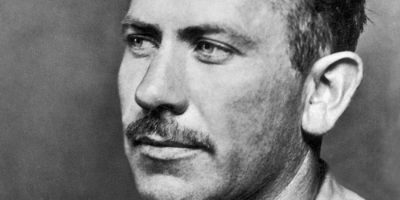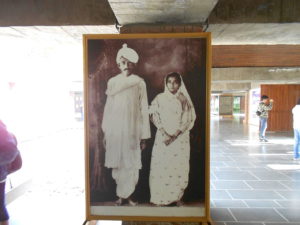Top 10 Facts about Gandhi
Top 10 Facts about Gandhi
Mohandas Karamchand Gandhi, popularly known as ‘Gandhi’, was an Indian lawyer, anti-colonial nationalist and political ethicist. Gandhi was born on 2 October 1869 into an Indian Gujarati Hindu Modh Baniya family. It was in Porbandar (also known as Sudamapuri). This is a coastal town on the Kathiawar Peninsula and then part of the small princely state of Porbandar in the Kathiawar Agency of the Indian Empire. Gandhi was popular for his use of non-violent resistance in leading the successful campaign for India’s independence from British Rule. He inspired movements for civil rights and freedom across the world.
1. Gandhi studied law
Born and raised in a Hindu family in coastal Gujarat, western India, Gandhi was trained in law at the University College, London, which is a constituent college of the University of London. He studied law and jurisprudence and was invited to enrol at Inner Temple with the intention of becoming a barrister. His childhood shyness and self withdrawal had continued through his teens, and he remained so when he arrived in London, but he joined a public speaking practise group and overcame this handicap to practice law. He was called to the bar at age 22 in June 1891.
2. Gandhi’s father worked for the state
Gandhi’s father, Karamchand Uttamchand Gandhi, served as the diwan of Porbandar state. A diwan at various points in Islamic history was designated to powerful government officials, ministers, or rulers. A diwan was the head of a state institution of the same name. Diwans belonged to royal families in the history of Mughal Persian India and held high posts within the government.
3. Gandi wedded in his teens
At 13, Gandhi wed Kasturba Makanji, the daughter of a merchant. It was an arranged marriage as Gandhi had been engaged to her since he was seven years old. The couple went on to have four sons. Even when Gandhi took a vow of celibacy in 1906 for reasons of spirituality, self-discipline and commitment to public service, his wife remained married to him until her death at age 74. She died at the Aga Khan Palace in present-day Pune, India, where the Gandhis had been incarcerated by the British since 1942 for their political activism.
4. He spent his early adulthood in Africa
After uncertain years in India where he was unable to start a successful law practice, he moved to South Africa in 1893 to represent an Indian merchant in a lawsuit. He went on to stay for 21 years. It was in South Africa that Gandhi raised a family, and first employed nonviolent resistance in a campaign for civil rights. In 1915, aged 45, he returned to India.
5. His activism did not begin in India

https://commons.wikimedia.org/wiki/File:Mahatma_Gandhi_with_women_textile_workers_at_Darwen,_Lancashire.jpg
Gandhi’s activism started in South Africa. While in Africa, he was given legal work through an Indian firm. It was there that he and his fellow Indians encountered constant discrimination by the Dutch and the British, which in turn, inspired him to fight for their rights. During his time in South Africa, where he was imprisoned many times, he developed his concept of peaceful resistance and “satyagraha“. This is a term used to describe the act of holding on to truth, or truth force, is a particular form of nonviolent resistance or civil resistance. Someone who practices satyagraha is a satyagrahi. The term satyagraha was coined and developed by Mahatma Gandhi.
6. He was nominated for a Nobel peace prize more than once
Gandhi was nominated for a Nobel Peace Prize in 1937, 1938, 1939 and 1947, but never received the award. He was also nominated in 1948, the year he was assassinated, but the Nobel committee opted not to bestow him with the award posthumously. Instead, the committee announced there was “no suitable living candidate” that year and no winner was named. American civil-rights leader Martin Luther King Jr., the 1964 Nobel Peace Prize winner, acknowledged Gandhi‘s work in his acceptance speech, and the 1989 Nobel winner, the 14th Dalai Lama, called his award a tribute to “my mentor, Mahatma Gandhi.” In 2006, the Nobel committee publicly expressed regret that Gandhi had never been given the prize.
7. Mohandas and Indira were not related
Yes, they shared a name, however, Mohandas Gandhi and Indira Gandhi (1917-84), India’s prime minister from 1966 to 1977 and 1980 to 1984, weren’t kin. Indira Gandhi was the daughter of Jawaharlal Nehru (1889-1964), the first prime minister of independent India, from 1947 until his death. After Indira Gandhi was assassinated by two of her Sikh bodyguards, she was succeeded as prime minister by her son Rajiv (1944-91), who served in the position until 1989. He too was assassinated, in a suicide bombing blamed on a terrorist group from Sri Lanka.
8. Gandhi was not the best student
Gandhi was not the best student. Although he was known for being highly ethical with good English skills, he was considered a mediocre student in math and poor in Geography. He also had bad handwriting, which he was embarrassed about.
9. Gandhi was extremely shy as a child
Those who knew Gandhi as a child would have never predicted that he would ever attract millions of followers as the founder of his nation. He was extremely shy and it is documented that he even described his experiences running home from school so he wouldn’t have to talk to anybody.
10. He was assassinated
Beguile walking to a prayer meeting in New Delhi on the evening of January 30, 1948; Gandhi was shot three times at close range by Hindu nationalist Nathuram Godse. The gunman blamed Gandhi for going along with the 1947 plan that partitioned British India along religious lines into two new independent states: Hindu-dominated India and Muslim-dominated Pakistan.
Following the partition, riots broke out across India between Hindus and Muslims, and Godse was angered by Gandhi’s calls for an end to the bloodshed and believed the pacifist icon was gratifying Muslims. Godse was quickly apprehended after Gandhi’s murder, and in November 1949 he and a co-conspirator were hanged for their crimes. Another group of men involved in the plot, including Godse’s brother, received prison sentences.
Now you know the top 10 facts about Gandhi. I hope you enjoyed reading this article.
Planning a trip to Paris ? Get ready !
These are Amazon’s best-selling travel products that you may need for coming to Paris.
Bookstore
- The best travel book : Rick Steves – Paris 2023 – Learn more here
- Fodor’s Paris 2024 – Learn more here
Travel Gear
- Venture Pal Lightweight Backpack – Learn more here
- Samsonite Winfield 2 28″ Luggage – Learn more here
- Swig Savvy’s Stainless Steel Insulated Water Bottle – Learn more here
Check Amazon’s best-seller list for the most popular travel accessories. We sometimes read this list just to find out what new travel products people are buying.













